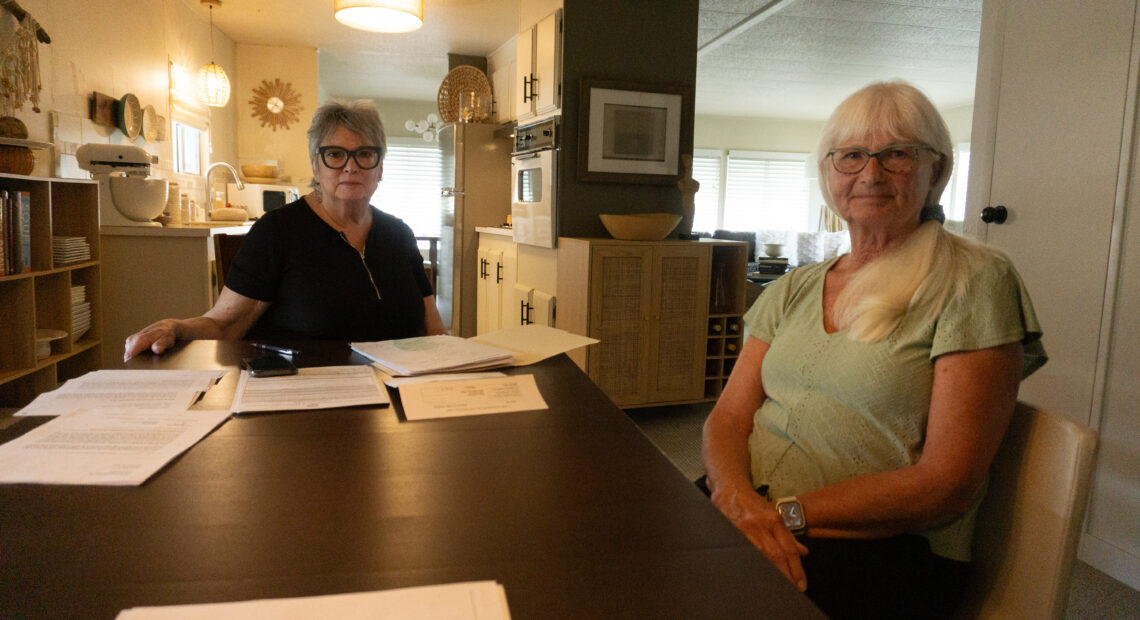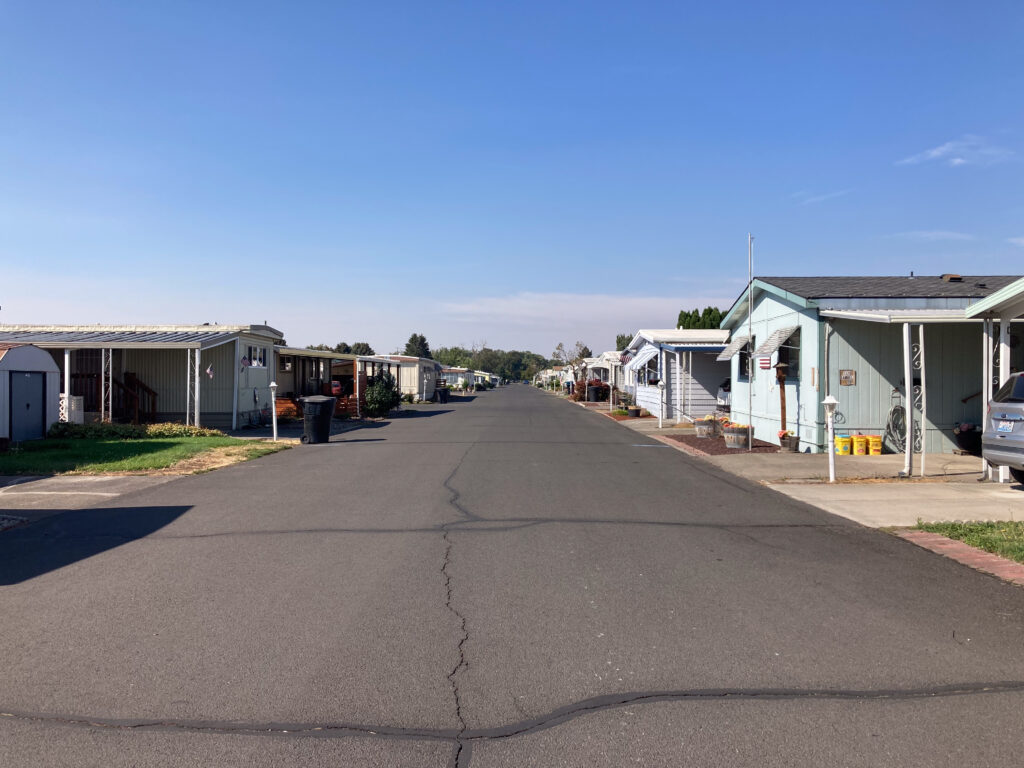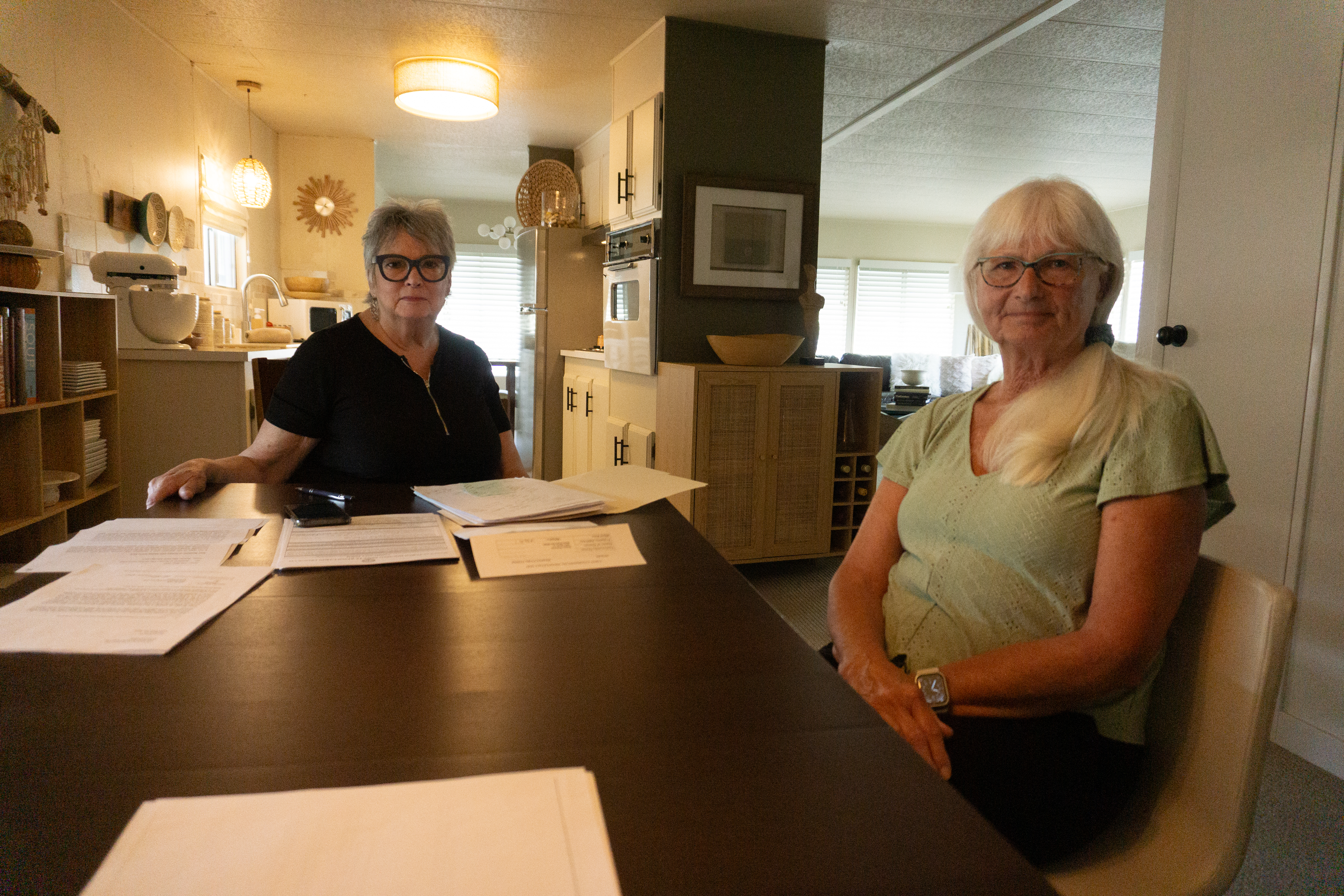
Residents of senior mobile home park fight 44% rent increase
Listen
(Runtime 4:01)
Read
Rancho Villa is a mobile home park for seniors in Walla Walla. It has clean streets, cheery lawn ornaments and neighbors who stop to chat on evening walks. It was built in the 1960s by Arnold E. Jones, who lived there until he died.
As in most mobile home parks, residents own their homes, but not the ground they sit upon. So each month, residents pay “lot rent” to the park’s owner.
Around three years ago, that owner became First Commercial Properties NW, a company based in Bothell.
“We were never told ahead of time that this was being sold,” said Beverly Barksdale, who lives in the park with her husband. Two of her older sisters live there, too. “It was just, we wake up one day and it’s like, it’s sold. And we go, ‘Oh my goodness.’”
Though Washington now has a law that gives mobile home park residents more notice and rights if an owner wants to sell, it hadn’t yet passed when Rancho Villa sold.
Since its purchase, First Commercial has raised lot rents annually. This year, it’s raising them by 44%. The new lot rent is $600 a month, more than double what it was three years ago.
The company also started charging for water, sewer and trash — utilities that were previously included in the rent — as well as a $6 monthly billing fee.
“How they sleep at night amazes me,” Barksdale said. “All they want to do is pad their pocket; what they’re doing is destroying mobile home parks.”
When Barksdale heard about the 44% rent spike, she thought it was a mistake. When she learned it wasn’t, she anguished over her fellow residents, many of whom are on fixed incomes.
“As I’ve got to meet my neighbors and know them and see their struggles, it just hurts my heart,” Barksdale said.
One of her sisters, who is 94 years old, receives $1,200 per month in Social Security benefits. Once her utilities, lot rent and mortgage are taken out, she’ll be living on less than $300 per month.

A street in Rancho Villa, a senior mobile home community in Walla Walla. (Credit: Susan Shain / NWPB)
What’s happening at Rancho Villa isn’t unusual. Across the country, corporations are purchasing mobile home parks and raising rents.
Some new owners simply want more money. Others want to displace residents and turn parks into luxury condos, for example. Seeing the writing on the wall, residents of Walla Walla’s mobile home parks lobbied for a moratorium on such redevelopment; it passed last year.
Still, rising rents and fees are a cause for concern, said Rachael Myers, executive director of the Washington Low Income Housing Alliance.
“The impact of these rent increases on people is really, really enormous,” Myers said. She noted that even seemingly small amounts, like $50 or $100, can be devastating to tenants on fixed incomes. She’s heard from people who have forgone medication or heat to afford such jumps.
In Washington, Myers said, “It’s perfectly legal for rents to be raised 20, 30, 40, 50%, and that is not uncommon.”
That’s not the case in Oregon or California, where much of the housing is rent stabilized.
Rent stabilization limits the amount that landlords can raise a current tenant’s rent. For example, there might be a cap of 7% to 10% annually. Rent stabilization does not limit how much landlords can raise the rent when new tenants move in.
The past two years, a rent stabilization bill has failed in Washington’s Legislature. In 2024, it passed in the House, but didn’t make it to a vote in the Senate.
Both of Walla Walla’s state representatives, Rep. Mark Klicker and Rep. Skyler Rude, voted against the House bill.
“Most of the provisions on the bill would not have helped residents of Rancho Villa and would have harmed other rental sectors,” Rude said. As examples, he cited the bill’s limits on move-in and late fees. Rude said he supports efforts to keep affordable housing in the hands of those who need it, such as community land trusts or deed restrictions, but he does not think rent stabilization is the answer.
Both he and Klicker said the bill might have pushed landlords to raise the rent by the maximum percentage allowed each year, in order to hedge against future increases in the cost of taxes and insurance. Klicker also said the bill would have disincentivized development, thereby adding to the affordable housing shortage.
“It’s counterproductive,” Klicker said of the bill. “The one thing it doesn’t do is stabilize rent.” He pointed to other cities, such as St. Paul, Minnesota, that introduced rent stabilization only to walk it back.
Instead of rent stabilization, Klicker said future legislation should make it easier to build housing, through streamlined permitting and regulatory processes, for example. In the short-term, he supports creating vouchers to cover the gap between a tenant’s income and rent, and offering tax incentives to landlords who maintain or reduce rental prices.
Some of these approaches may be included in legislative proposals next year. Rent stabilization is one policy that will almost surely be on the docket. If it passes, the resulting law would apply to mobile home parks, too.
Such parks are some of the last linchpins of affordable housing, said Renee Rooker, head of the Walla Walla Housing Authority.
Rancho Villa, for instance, has 240 units that house hundreds of seniors. If they can’t afford the new rent, Rooker said they don’t have many other options. “Where are they going to go?” she asked. “There isn’t anything else that they could purchase that’s affordable.”
Rooker’s agency builds and manages properties, so she understands the importance of turning a profit. But she doesn’t think that justifies what is happening at Rancho Villa.
“I just think it’s criminal, like, it makes me angry,” she said. “How would you like it if someone increased your mortgage 44%?”
Residents of Rancho Villa have repeatedly contacted First Commercial about their concerns. Sharon Sweeney wrote a letter back in July, and has followed up via email three times.
“It’s a very sad situation with absolutely no feedback from the ownership,” she said. “The company is promoting this as a 55+ affordable living space. That bothers me when I see that, because in my opinion, this is not affordable.”
Sweeney said that she doesn’t know of anyone who’s heard back from First Commercial. The company didn’t respond to Northwest Public Broadcasting’s questions either.
Dorothy Knudson, a former minister, is one of many Rancho Villa residents who have been fighting to protect their community for years. “We need more affordable housing everywhere in the nation,” she said. “And this, at least, provides somewhat affordable housing.”
Most recently, residents filed complaints with Washington’s attorney general through the office’s Manufactured Housing Dispute Resolution Program.
Residents alleged that First Commercial has failed to maintain the park’s infrastructure and address issues such as low water pressure. They described an “atmosphere of fear, harassment and retaliation” in which they have been punished for making maintenance requests. They said they’ve been ordered to fix driveways or trim trees — tasks that are the responsibility of park owners, not tenants.
Lastly, they asked the attorney general to prevent First Commercial from implementing its latest rent increase. While the company said the hike is based on rising market values, residents said the average rent in comparable local parks is $475, including utilities.
“This proposed hike is not justified and seems to be a punitive measure against the community,” residents concluded. “We ask the Attorney General to intervene immediately to protect our rights and prevent this unfair rent increase.”
They haven’t gotten a resolution yet. But the residents of Rancho Villa have no plans to back down. Their homes, they said, are worth it.
UPDATE: This story has been updated with additional information.
















